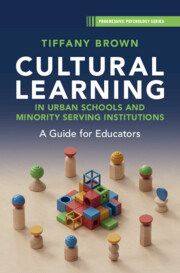Book contents
- Cultural Learning in Urban Schools and Minority Serving Institutions
- The Progressive Psychology Book Series
- Cultural Learning in Urban Schools and Minority Serving Institutions
- Copyright page
- Contents
- Figures and Tables
- Introduction
- Chapter 1 An Action Science Approach to Cultural Learning in Urban Schools and Minority Serving Institutions (MSIs)
- Chapter 2 Directly Observable Data on K-12 Teachers in Urban Schools
- Chapter 3 Culturally Accepted Meanings and Understandings Shared by K-12 Urban Teachers
- Chapter 4 Individual Action Strategies K-12 Urban Teachers Use at Work
- Chapter 5 Collective Action Strategies K-12 Urban Teachers Use at Work
- Chapter 6 Single-Loop Learning and Double-Loop Learning Conditions in Urban Schools
- Chapter 7 Implications from the Systematic Review for Four Types of Cultural Learning K-12 Urban Teachers Engage in at Work
- Chapter 8 Empirical Research on College Faculty Thinking and Action in a Minority Serving Institution
- Chapter 9 Faculty Value Orientations for Single-Loop Learning and Double-Loop Learning at Work with Students from LIMCCs
- Chapter 10 Consequences of Model I and Model II Values for Learning across Student–Teacher Cultural Differences in MSIs
- Chapter 11 Faculty Variance in Use of Traditional and Culturally Responsive Classroom Management Strategies
- Chapter 12 Consequences of Variance in Use of Traditional and Culturally Responsive Classroom Management Strategies for Learning across Student–Teacher Differences in MSIs
- Chapter 13 Implications from the Empirical Data for Instructor Learning across Cultures in MSIs
- Conclusion
- Appendices
- References
- Subject Index
Introduction
How Cultural Learning Matters for Educators Everywhere
Published online by Cambridge University Press: 20 March 2025
- Cultural Learning in Urban Schools and Minority Serving Institutions
- The Progressive Psychology Book Series
- Cultural Learning in Urban Schools and Minority Serving Institutions
- Copyright page
- Contents
- Figures and Tables
- Introduction
- Chapter 1 An Action Science Approach to Cultural Learning in Urban Schools and Minority Serving Institutions (MSIs)
- Chapter 2 Directly Observable Data on K-12 Teachers in Urban Schools
- Chapter 3 Culturally Accepted Meanings and Understandings Shared by K-12 Urban Teachers
- Chapter 4 Individual Action Strategies K-12 Urban Teachers Use at Work
- Chapter 5 Collective Action Strategies K-12 Urban Teachers Use at Work
- Chapter 6 Single-Loop Learning and Double-Loop Learning Conditions in Urban Schools
- Chapter 7 Implications from the Systematic Review for Four Types of Cultural Learning K-12 Urban Teachers Engage in at Work
- Chapter 8 Empirical Research on College Faculty Thinking and Action in a Minority Serving Institution
- Chapter 9 Faculty Value Orientations for Single-Loop Learning and Double-Loop Learning at Work with Students from LIMCCs
- Chapter 10 Consequences of Model I and Model II Values for Learning across Student–Teacher Cultural Differences in MSIs
- Chapter 11 Faculty Variance in Use of Traditional and Culturally Responsive Classroom Management Strategies
- Chapter 12 Consequences of Variance in Use of Traditional and Culturally Responsive Classroom Management Strategies for Learning across Student–Teacher Differences in MSIs
- Chapter 13 Implications from the Empirical Data for Instructor Learning across Cultures in MSIs
- Conclusion
- Appendices
- References
- Subject Index
Summary
This chapter reviews information about the demographic and democratic imperatives prompting K-16 educators to reconsider what they do not know about their students’ cultural backgrounds in urban schools and minority serving institutions (MSIs). It highlights the connection between the student–teacher racial mismatch characterizing K-16 contexts in the United States and a coexistent cultural mismatch. It makes an argument that these demographic characteristics present a human capital challenge that ultimately diminishes teacher effectiveness at learning across cultural differences between themselves and their students in urban schools and MSIs. It concludes by modeling this human capital challenge as a knowing–doing gap using a framework from the organizational literature.
- Type
- Chapter
- Information
- Cultural Learning in Urban Schools and Minority Serving InstitutionsA Guide for Educators, pp. 1 - 8Publisher: Cambridge University PressPrint publication year: 2025

